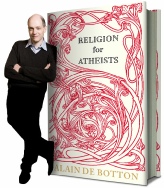




 NEXT
NEXT
 BACK
BACK

Philosophical musings on Quanta & Qualia; Materialism & Spiritualism; Science & Religion; Pragmatism & Idealism, etc.



 Recent Posts
Recent Posts
Atheism with a religious face
https://www.ted.com/talks/alain_de_botton_atheism_2_0
Post 16. February 14, 2018
Atheism 2.0 & Deism 2.0
Religious Revivals for the 21st century
In a TED talk a few years ago, philosophical writer Alain de Botton, proposed that the New Atheists were wrong to reject religion altogether. He agreed with them that many religious doctrines are no longer plausible, but some of their tools & techniques may still be useful in modern societies, which seem to be coming apart at the seams. So he says that their long experience with binding people into stable communities may offer models for re-
Referring to the title of his talk, he asks «What is atheism 2.0? Well, it starts from a very basic premise -
To begin with, he suggests that we emulate the "ritualistic side, the moralistic, the communal side of religion". In addition to their impressive massive processions, repetitive sermons for the illiterate, frequent doctrine-
The speaker was not recommending that Atheists literally copy the trappings of traditional religions. Perhaps, he was merely saying that we could learn a thing or two about how to relate to the masses of emotion-
In fact, he dryly observes that most religions rule their flocks by treating them like credulous kids. "Indeed all major religions at various points call us children". As a source of wisdom to nourish his immature Atheist brood, he proposes to replace sacred writings with secular texts. Instead of ancient scriptures, "it's to culture that we should look for guidance, for consolation, for morality. Let's look to the plays of Shakespeare, the dialogues of Plato, the novels of Jane Austen. In there, we'll find a lot of the truths that we might previously have found in the Gospel of St. John." He acknowledges that all or us, at some time or other, "need guidance, and we need didactic learning".
Post 16 continued . . . click Next

Note 1 :
By comparison, our modern skyscrapers may inspire financial humility in the presence of those monuments to mundane capitalist power, but little reverence for their moral authority.